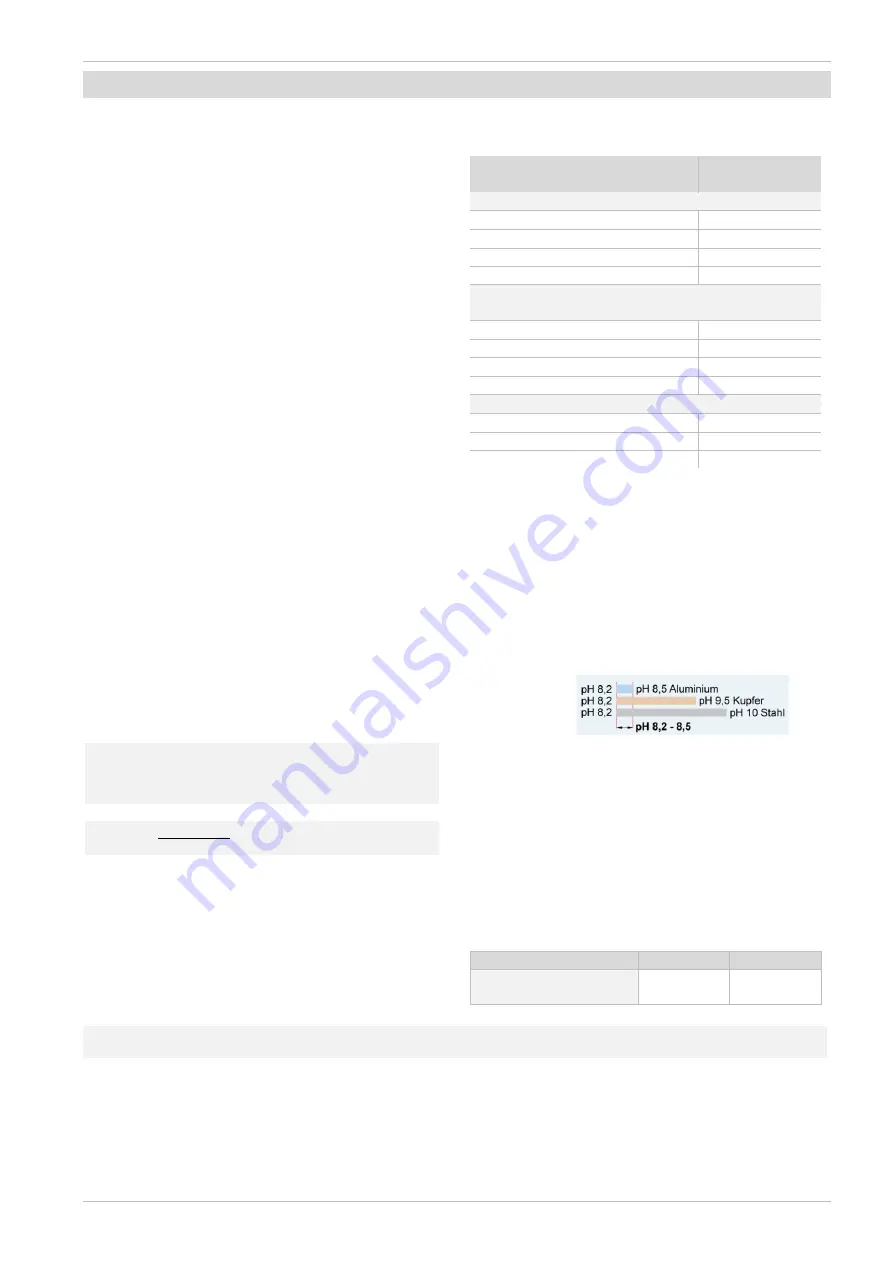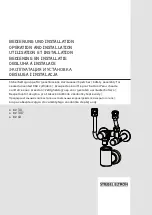
Hydraulic connection
Installation manual
pellet
top
13
6
Hydraulic connection
6.1 Fill-up water requirements
General recommendations for installation
- Fit an upstream filter (<25 µm) to prevent particles
getting into the heating water.
- Position shut-off valves for each section (in buffer
tank, etc.) in order to minimise heating water loss in
the event of repairs or system extensions.
Corrosion
Corrosion is usually triggered by the available oxygen in
the water. This value can be brought into a safe range
with proper planning, design, installation and mainte-
nance of the heating system.
Important:
Pressure maintenance at regular intervals
(system pressure, pressure in the expansion tank)
Formation of scaling
Scaling refers to heating water deposits on the heat
exchanger of the boiler. The cause of scaling is the
presence of limestone in the water. If the value (total
hardness °dH) is too high, the fill-up water must be
treated.
Parameters that play a role in the formation of scaling:
-
System volume
(the bigger it is, the less total hard-
ness is permissible, e.g. buffer tank fitted, boiler cas-
cade, etc.).
-
Boiler output
(the bigger it is, the less total hardness
is permissible).
To determine the total allowable hardness for the
system, the specific water content must be deter-
mined
:
System volume
(litres)
=
Spec. water content of the
system
(l/kW)
Boiler output (kW)
Example:
1166
litres
= 46.64 l/kW
25 kW
Overall output of heat supply
German hard-
ness
Specific water content of the system <20 l / kW
≤ 50 kW
≤ 16.8 °dH
> 50
kW to ≤ 200 kW
≤ 11.2 °dH
> 200 kW to ≤ 600 kW
≤ 5.6 °dH
> 600 kW
≤ 2.8 °dH
Specific water content of the system ≥ 20 l/kW, but
< 50 l/kW
≤ 50 kW
≤ 11.2 °dH
> 50 kW to ≤ 200 kW
≤ 5.6 °dH
> 200 kW to ≤ 600 kW
≤ 2.8 °dH
> 600 kW
≤ 0.6 °dH
Specific
water content of the system ≥ 50 l/kW
≤ 50 kW
≤ 5.6 °dH
> 50 kW to ≤ 200 kW
≤ 2.8 °dH
> 200 kW
≤ 0.6 °dH
In the event of exceeding the above values, the fill-
up water is to be treated. Recommended action:
Softening (e.g., ion-exchange resin, the same pro-
cedure as for drinking water softening).
Check the pH of the fill-up water
- In the normal case (mixed installation) no
measures are required to influence the pH (con-
trol: value should be in the range of 8.2 to 10).
Exception: If aluminium materials are used in the
heating system, a pH from 8.2 to 8.5 must be met
(pH> 8.5 increased corrosion tendency).
- If the value is significantly less than <8.2 after
filling, then check again after 8-12 weeks
- If there is no increase in value, then add 10 g/m³
trisodium phosphate (Na3PO4) or 5 g/m³ sodium
hydroxide (NaOH).
- Allow 2-4 weeks of operation before further cor-
rections.
Electrical conductivity
Recommendation: Low salt driving (filling with de-
mineralised water), see VDI 2035 sheet 2.
Low salt
Salty
Electrical conductivity
at 25°C
< 100
µS/cm
100
– 1500
µS/cm
Compliance with the above mentioned standards / regulations must be ensured by the heating engineer.
Summary of Contents for pellet top touch 35
Page 26: ...Annex 26 Installation manual pellettop 9 6 Commissioning log...
Page 27: ...Annex Installation manual pellettop 27...
Page 28: ...Annex 28 Installation manual pellettop 9 7 Customer service order form...
Page 29: ...Annex Installation manual pellettop 29...
Page 30: ...Annex 30 Installation manual pellettop...














































